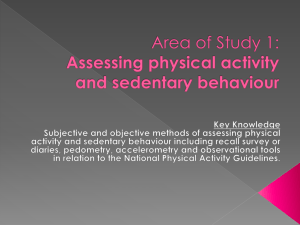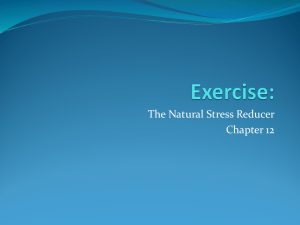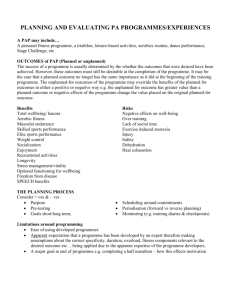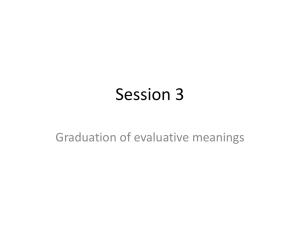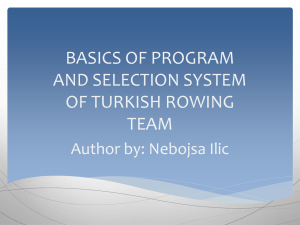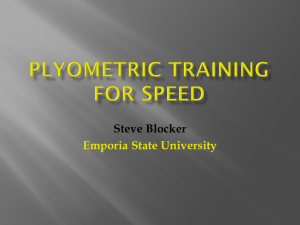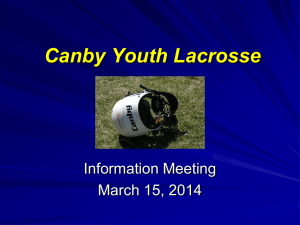Paddy Tally - Ulster GAA
advertisement
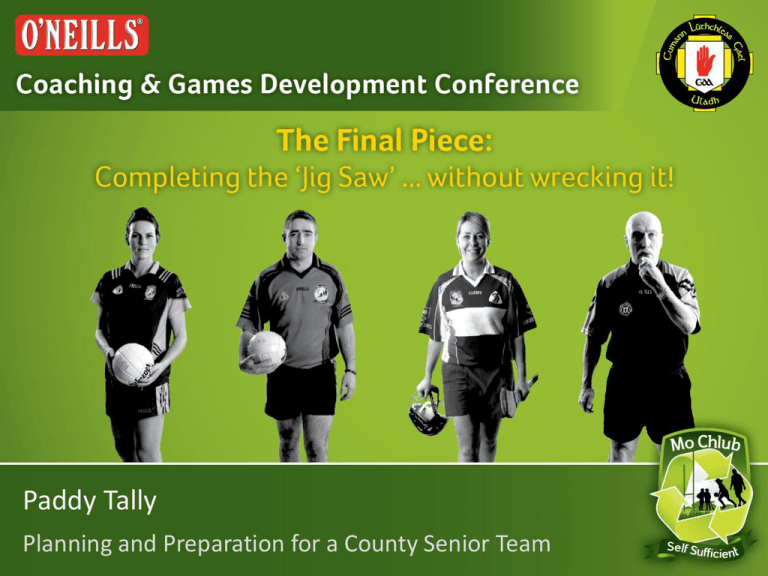
Paddy Tally Planning and Preparation for a County Senior Team Strategy, Structure and Systems Planning and Preparation for a County Senior Team Fail to prepare Prepare to fail Fail to prepare properly, You will fail! Planning: • Quality knowledge and understanding is essential when putting together a backroom team • Agreement from the backroom team on a strategic plan on the way forward • Build a sound and durable structure that will withstand the challenges of the year/s ahead Role as Team Coach and Trainer • Responsibility for the individual and collective Strength and Conditioning of the players • Work closely with Team Manager and fellow coaches to ensure continuity • Liase on a daily basis with the medical team with regard to injured players and plan appropriate re-hab training • Constantly reflect on and review practice PERIODISATION What is Periodisation? • Periodisation is planned long-term variation of the volume and intensity of training to prevent overtraining and promote optimal performance at the desired time. Defining Volume and Intensity • Volume- amount of work performed per exercise, per day, per month (sets x reps) • Intensity- the power output of the exercise (power = work/time) Estimating Volume and Intensity • Training intensity- Average level of exercise intensity, per week, per month • Exercise intensity- Monitored by calculating the relative intensity (% of maximum exertion) • Training volume- estimated by volume load • Exercise volume- estimated by average % of exercise exertion Periodisation Cycles • Macrocycle -long period of time, one year • Mesocycle - medium length of time, several weeks to several months • Microcycle- short length of time, one or more weeks KEY POINT Periodisation involves shifting training priorities from non-sport-specific activities of high volume and low intensity to sportspecific activities of low volume and high intensity over a period of many weeks to prevent overtraining and optimise performance. Matveyev’s Model of Periodisation: Appropriate for Novice Athletes Modifications of Matveyev’s Model of Periodisation; for Gaelic Games Players Periodisation Periods • Preparatory• Transition• Competition–Maintenance–Peaking • Active rest- Transition Phase • Modification to Matveyev’s original periodisation model, break between high volume training and high intensity training Competition Period • In Gaelic Games with long season, may last 9 months • Peaking- very high intensity and very low volume • Maintenance- moderate intensity (8085% max) and moderate volume (2-3 sets, 6-8 reps) Active Rest Any time during the training year • • • • Restoration Remain physically active Lasts 1-4 weeks Mental and physical break from sport Microcycle- competition phase Day Activity-Focus Duration Intensity Monday Gym-Power 40 minutes 90% Max Tuesday Pitch-Football 70 minutes High Wed Gym-Strength 40 minutes Medium Thursday Pitch-Football 50 Minutes Med/High Friday Pool Session 25/30 Mins. Low Saturday Rest and hydration Game All Day Low 70+ Mins Max! Sunday Coaches duties • • • • • • • • • • Planning and monitoring gym sessions Match analysis-video review Planning pitch sessions based on analysis Analysis feedback to players Management planning match strategy and systems Coaching players through planned strategy Individual skill coaching and analysis Monitoring player hydration and wellness Mentoring players when necessary Logistics re: game day preparation Lessons Learnt • Progress was made • Better understanding of our strengths and weaknesses as a management team • Better understanding of the players and their strengths and weaknesses • Experience of playing at a higher level • You have to perform
